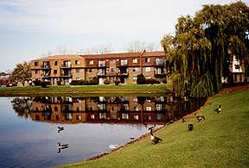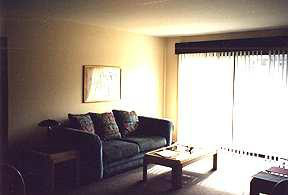
Adult Residential Program Philosophy and Purpose
The Residential Program is a therapeutic, community-based program. The philosophy in our treatment approach is that all of a client’s needs must be recognized and addressed to provide meaningful support and intervention. The Residential Program is designed to assist each client in meeting his/her individual needs and to achieve his/her full potential. The interaction between the client’s deafness and his/her emotional stability, cognitive functioning, and personal relationships affects all areas of life. If these problem areas are addressed therapeutically, the client’s overall level of functioning and capacity to function in a less restrictive environment is enhanced.
Program Objectives
In order to adequately address the varied needs of each client, the program objectives must be multi-faceted and interrelated. The program is designed to work in conjunction with the educational and vocational programs. All program objectives are related to skill development and increasing the client’s ability to function in a less restrictive environment.
The Residential Program, in conjunction with the Centerpoint Vocational Program, aim to achieve these objectives by
providing a comprehensive treatment program designed to address the individual needs of each client.
Residential Housing
Residential units are comprised of apartments or townhouses in the community. No more than five clients reside in each unit. These residences are located in the Glenview and Northbrook townships and are maintained in compliance with state and local ordinances for health, safety and sanitation. All residences have air conditioning, adequate lighting and ventilation. Each site is equipped with an approved fire alarm system. All units have telephones and a TTY for client use.
Living Room Areas
Each residence has a living room area that has a view of the outdoors and provides socialization opportunities for the clients who reside in the unit. Living rooms are equipped with a TV with closed captioning and a supply of games for leisure activities.
Bedrooms
In most units, two clients share a bedroom. When it is clinically indicated, temporary arrangements may be made to separate a client for safety. Sleeping areas are assigned based on gender, age and developmental ability. All sleeping rooms have a door for privacy. Adequate drawer and closet space is provided for each client for their personal belongings. In some units, personal care items are kept in a locked closet near the client’s room to ensure safety. Clients are allowed to keep and display personal items such as posters, family pictures, etc.
Dining Areas
Dining room areas are provided in each residence and are designed to promote a family style environment with social interaction during meal and snack time. Clients have three scheduled meal times and scheduled snack times per day. Kitchen and dining areas are located in each unit and are accessible to clients. Dining areas are always supervised during meals and snacks.
The Residential Program is a therapeutic, community-based program. The philosophy in our treatment approach is that all of a client’s needs must be recognized and addressed to provide meaningful support and intervention. The Residential Program is designed to assist each client in meeting his/her individual needs and to achieve his/her full potential. The interaction between the client’s deafness and his/her emotional stability, cognitive functioning, and personal relationships affects all areas of life. If these problem areas are addressed therapeutically, the client’s overall level of functioning and capacity to function in a less restrictive environment is enhanced.
Program Objectives
In order to adequately address the varied needs of each client, the program objectives must be multi-faceted and interrelated. The program is designed to work in conjunction with the educational and vocational programs. All program objectives are related to skill development and increasing the client’s ability to function in a less restrictive environment.
- To provide a supportive, structured environment in which the clients are able to communicate with and relate to peers, staff, and members of the community.
- To assist the client in maintaining appropriate behaviors.
- To assist the client in developing daily living skills needed to function independently.
- To strengthen the client’s ability to communicate effectively with others by using Total Communication.
- To improve the client’s ability to relate to others socially and maintain effective relationships with others.
- To provide educational and vocational support to enhance skill development necessary for self-support and improved self-sufficiency.
- To assist each client in beginning to assume personal responsibility for themselves and their behavior.
The Residential Program, in conjunction with the Centerpoint Vocational Program, aim to achieve these objectives by
providing a comprehensive treatment program designed to address the individual needs of each client.
Residential Housing
Residential units are comprised of apartments or townhouses in the community. No more than five clients reside in each unit. These residences are located in the Glenview and Northbrook townships and are maintained in compliance with state and local ordinances for health, safety and sanitation. All residences have air conditioning, adequate lighting and ventilation. Each site is equipped with an approved fire alarm system. All units have telephones and a TTY for client use.
Living Room Areas
Each residence has a living room area that has a view of the outdoors and provides socialization opportunities for the clients who reside in the unit. Living rooms are equipped with a TV with closed captioning and a supply of games for leisure activities.
Bedrooms
In most units, two clients share a bedroom. When it is clinically indicated, temporary arrangements may be made to separate a client for safety. Sleeping areas are assigned based on gender, age and developmental ability. All sleeping rooms have a door for privacy. Adequate drawer and closet space is provided for each client for their personal belongings. In some units, personal care items are kept in a locked closet near the client’s room to ensure safety. Clients are allowed to keep and display personal items such as posters, family pictures, etc.
Dining Areas
Dining room areas are provided in each residence and are designed to promote a family style environment with social interaction during meal and snack time. Clients have three scheduled meal times and scheduled snack times per day. Kitchen and dining areas are located in each unit and are accessible to clients. Dining areas are always supervised during meals and snacks.

Meals
Clients have an active part in preparing and selecting their meals based on their skill level and abilities. Clients participate in a weekly living skills group which teaches skills in nutrition, menu planning, making a shopping list and going grocery shopping.
Housekeeping
As part of the Living Skills program, clients are responsible for keeping their living environment clean and orderly. Each client is assigned responsibilities for making their bed, cleaning their bedroom and participating in the day-to-day housekeeping chores of their residence. Weekly chores are assigned to each client. Staff assists clients in developing skills in this area.
Activities
Opportunities for community integration occur regularly. Each residence has a schedule for recreational and living skills activities and these schedules vary by residence. Weekly activities may include going to the mall, library, YMCA, or a park. Various recreational activities are planned during weekend scheduling. Living Skills groups occur weekly in the areas of budgeting, menu planning, grocery shopping, housekeeping, grooming, health, and social development. Goals are developed for each client in these areas to assist each client in reaching his/her maximum potential for self-sufficiency. Clients participate in weekly budget groups. These groups are part of the residential Living Skills program and are designed to assist each client in learning money management skills.
Grooming and Hygiene
Each client is expected to maintain good grooming and hygiene habits. Staff assist each client in developing goals and learning skills in these areas. Each client is expected to shower and change his or her clothes daily. Clients are encouraged to assume responsibility for self-care in bathing, brushing teeth and caring for their hair and nails.
Personal Allowance
Each client receives a monthly personal allowance which is used for personal supplies, snacks, and activities. Staff provide training in money management skills and encourage each consumer to make good choices regarding their spending.
Staffing/Supervision
Each residence provides a home-like environment where staff provide support, supervision and guidance in the areas of daily living, socialization and behavior management. Trained staff provides 24-hour supervision for each site. Residences are assigned Team Leaders who are responsible for ensuring that personal needs are met. Support staff is available on site to provide crisis intervention during waking hours. Supervisors and the Residential Program Director are available by phone 24 hours a day. Clinical, educational and vocational staff work closely with residential treatment staff to provide consistent therapeutic programming for each client served.
Clients have an active part in preparing and selecting their meals based on their skill level and abilities. Clients participate in a weekly living skills group which teaches skills in nutrition, menu planning, making a shopping list and going grocery shopping.
Housekeeping
As part of the Living Skills program, clients are responsible for keeping their living environment clean and orderly. Each client is assigned responsibilities for making their bed, cleaning their bedroom and participating in the day-to-day housekeeping chores of their residence. Weekly chores are assigned to each client. Staff assists clients in developing skills in this area.
Activities
Opportunities for community integration occur regularly. Each residence has a schedule for recreational and living skills activities and these schedules vary by residence. Weekly activities may include going to the mall, library, YMCA, or a park. Various recreational activities are planned during weekend scheduling. Living Skills groups occur weekly in the areas of budgeting, menu planning, grocery shopping, housekeeping, grooming, health, and social development. Goals are developed for each client in these areas to assist each client in reaching his/her maximum potential for self-sufficiency. Clients participate in weekly budget groups. These groups are part of the residential Living Skills program and are designed to assist each client in learning money management skills.
Grooming and Hygiene
Each client is expected to maintain good grooming and hygiene habits. Staff assist each client in developing goals and learning skills in these areas. Each client is expected to shower and change his or her clothes daily. Clients are encouraged to assume responsibility for self-care in bathing, brushing teeth and caring for their hair and nails.
Personal Allowance
Each client receives a monthly personal allowance which is used for personal supplies, snacks, and activities. Staff provide training in money management skills and encourage each consumer to make good choices regarding their spending.
Staffing/Supervision
Each residence provides a home-like environment where staff provide support, supervision and guidance in the areas of daily living, socialization and behavior management. Trained staff provides 24-hour supervision for each site. Residences are assigned Team Leaders who are responsible for ensuring that personal needs are met. Support staff is available on site to provide crisis intervention during waking hours. Supervisors and the Residential Program Director are available by phone 24 hours a day. Clinical, educational and vocational staff work closely with residential treatment staff to provide consistent therapeutic programming for each client served.
